Excavation Contractors Jefferson
Find the best Excavation Contractors Near Me in Jefferson
Receive up to 3 Excavation Companies quotes for your project today! Compare profiles, reviews, accreditations, portfolio, etc... and choose the best service.
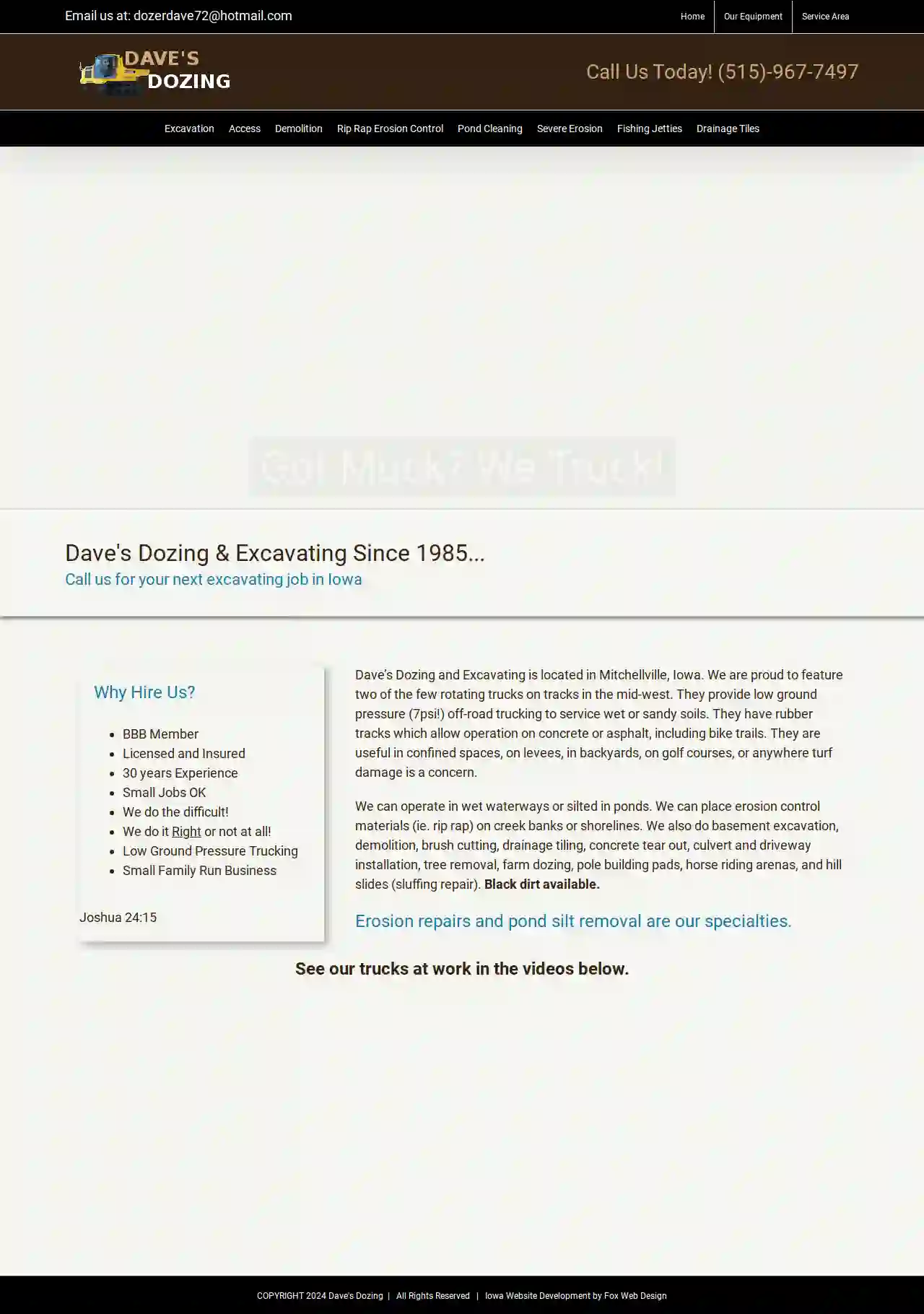
Dave's Dozing & Excavating
53 reviewsMitchellville, USWhy Hire Us? BBB Member Licensed and Insured 30 years Experience Small Jobs OK We do the difficult! We do it Right or not at all! Low Ground Pressure Trucking Small Family Run Business Joshua 24:15 Dave’s Dozing and Excavating is located in Mitchellville, Iowa. We are proud to feature two of the few rotating trucks on tracks in the mid-west. They provide low ground pressure (7psi!) off-road trucking to service wet or sandy soils. They have rubber tracks which allow operation on concrete or asphalt, including bike trails. They are useful in confined spaces, on levees, in backyards, on golf courses, or anywhere turf damage is a concern. We can operate in wet waterways or silted in ponds. We can place erosion control materials (ie. rip rap) on creek banks or shorelines. We also do basement excavation, demolition, brush cutting, drainage tiling, concrete tear out, culvert and driveway installation, tree removal, farm dozing, pole building pads, horse riding arenas, and hill slides (sluffing repair). Black dirt available. Erosion repairs and pond silt removal are our specialties. See our trucks at work in the videos below.
- Services
- Why Us?
- Gallery
Get Quote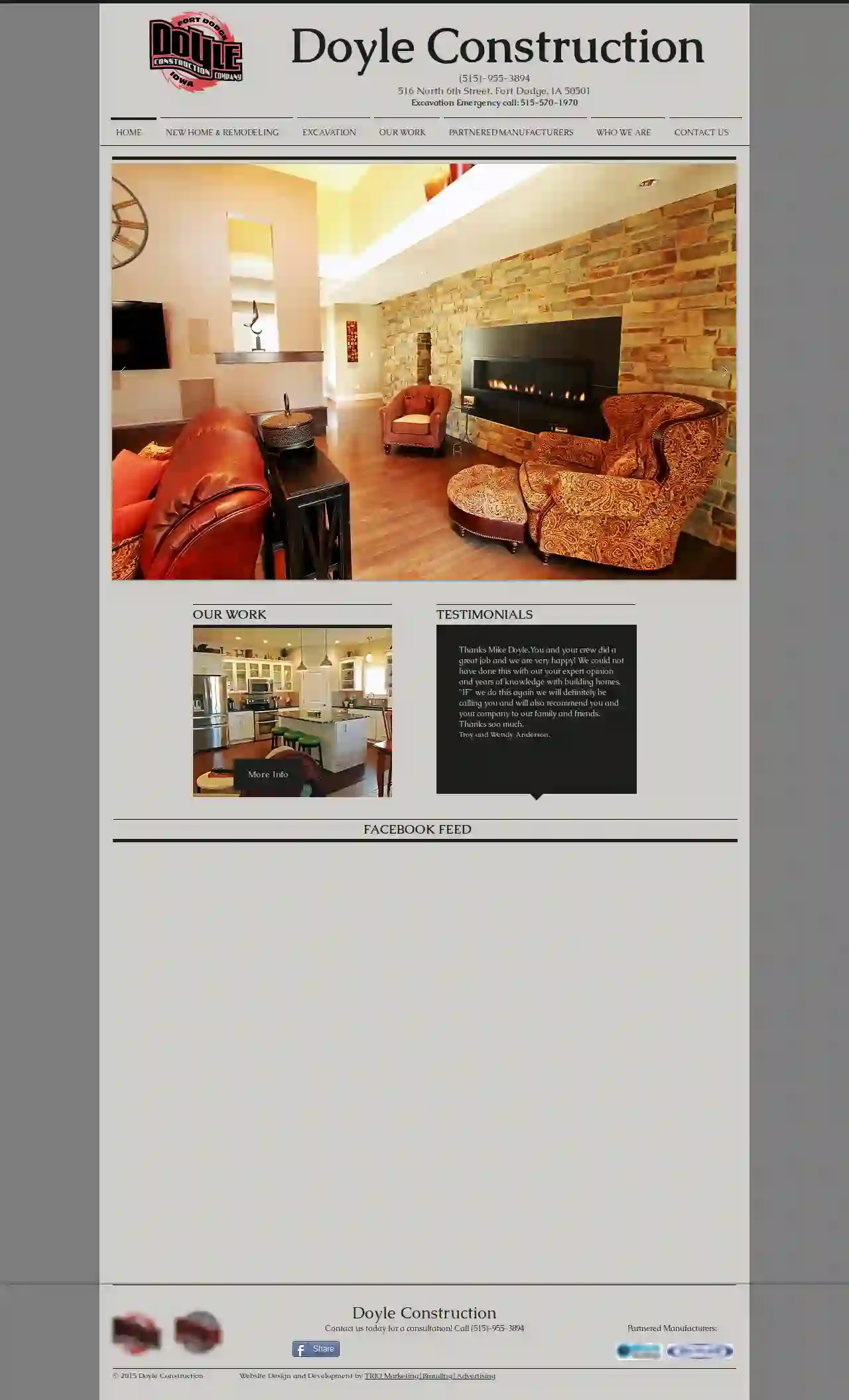
Doyle Construction
4.26 reviews516 North 6th Street, Fort Dodge, 50501, USDoyle Construction Doyle Construction is a family-owned and operated business with a long history of providing quality construction services to the Fort Dodge area. We specialize in new home construction, remodeling, and excavation. Our team of experienced professionals is committed to providing our clients with the highest level of service and craftsmanship. We are proud to be a part of the Fort Dodge community and we are dedicated to building homes and businesses that our community can be proud of. We are committed to providing our clients with the highest level of service and craftsmanship. We are proud to be a part of the Fort Dodge community and we are dedicated to building homes and businesses that our community can be proud of. We are committed to providing our clients with the highest level of service and craftsmanship. We are proud to be a part of the Fort Dodge community and we are dedicated to building homes and businesses that our community can be proud of.
- Services
- Why Us?
- Testimonials
- Gallery
Get Quote
Gravel Grading & Excavating, LLC
51 reviewsDes Moines, USFor two decades, Gravel Grading & Excavating has provided a broad spectrum of residential, commercial, municipal, and agricultural grading and excavating services to Cascade, Iowa, and surrounding area. From site preparation, to septic installation, to tile and erosion control for farm fields, we can move the earth for you!
- Services
- Why Us?
- Gallery
Get Quote
Prichard Construction Services
53 reviews123 Main Street, Anytown, 12345, USAbout Prichard Construction Services Prichard Construction Services is a family-owned and operated business with over 20 years of experience in the construction industry. We are committed to providing our clients with high-quality workmanship and exceptional customer service. We specialize in a wide range of construction services, including: New home construction Additions and renovations Commercial construction Roofing Siding Windows and doors Decks and patios Concrete work Landscaping We are a full-service construction company, so you can rest assured that we will handle every aspect of your project from start to finish. We are also fully licensed and insured, so you can be confident that your project is in good hands. We are committed to providing our clients with the highest level of satisfaction. We work closely with our clients to ensure that their vision is brought to life. We also offer competitive pricing and flexible financing options to make your project affordable. If you are looking for a reliable and experienced construction company, look no further than Prichard Construction Services. Contact us today for a free consultation.
- Services
- Why Us?
- Testimonials
Get Quote
641 Excavating
54 reviewsPella, USAbout Our Company 641 Excavating, owned by Jon and Morgan VanZee, is dedicated to creating lasting projects and building enduring relationships. We are committed to excellence by inspiring innovation and empowering passion. Located in Pella, Iowa we deliver that genuine smalltown connection to every project from start to finish.
- Services
- Why Us?
- Our Team
- Gallery
Get Quote
Al Price Hydro Excavation, Vac and Industrial Services
4.26 reviews2196 120th Street, Fort Dodge, 50501, USUnearth the Unknown with Non-Destructive Digging Our team pairs cutting-edge technology with 20 years of experience in the industry. As one of the first in the region to offer hydro excavation and vac services, we are able to offer maximum results with minimal disruption. We Service Industrial, Commercial, & Residential Customers We are your trusted source for commercial and industrial hydro excavation and vac services. With 20 years of industry experience and cutting-edge technology, our skilled team ensures maximum results with minimal disruption. From hydro excavation and air vac excavation to pot holing and high-pressure water jetting, we provide a comprehensive range of non-destructive digging solutions. Whether you need drain cleaning, sewer/septic service installation, or underground utility exposure, we’ve got you covered. Safety is our priority, and we pride ourselves on delivering quality work and exceptional customer service. Contact us today for a free consultation and experience the difference of Al Price Services, Inc.
- Services
- Why Us?
- Testimonials
- Gallery
Get Quote
Hero Paving
4.322 reviewsCharlottesville, USHero Paving: Your Trusted Asphalt Experts Hero Paving is your one-stop shop for all your asphalt needs in Charlottesville, VA and surrounding areas. We specialize in both residential and commercial paving, offering a wide range of services to meet your specific requirements. From driveway repairs and parking lot maintenance to new installations and resurfacing, we've got you covered. We understand the importance of a well-maintained asphalt surface. That's why we use only the highest quality materials and employ experienced professionals to ensure a durable and long-lasting finish. Our commitment to excellence is reflected in our satisfied customers and our reputation for delivering exceptional results. Whether you're a homeowner looking to enhance your curb appeal or a business owner seeking to improve your parking lot functionality, Hero Paving is here to help. We offer free consultations and on-site estimates to discuss your project and provide a personalized solution tailored to your needs. Don't let cracked driveways or faded parking lots detract from your property's value. Contact Hero Paving today and let us help you restore your asphalt surfaces to their former glory. We're confident you'll be another satisfied customer!
- Services
- Why Us?
- Gallery
Get Quote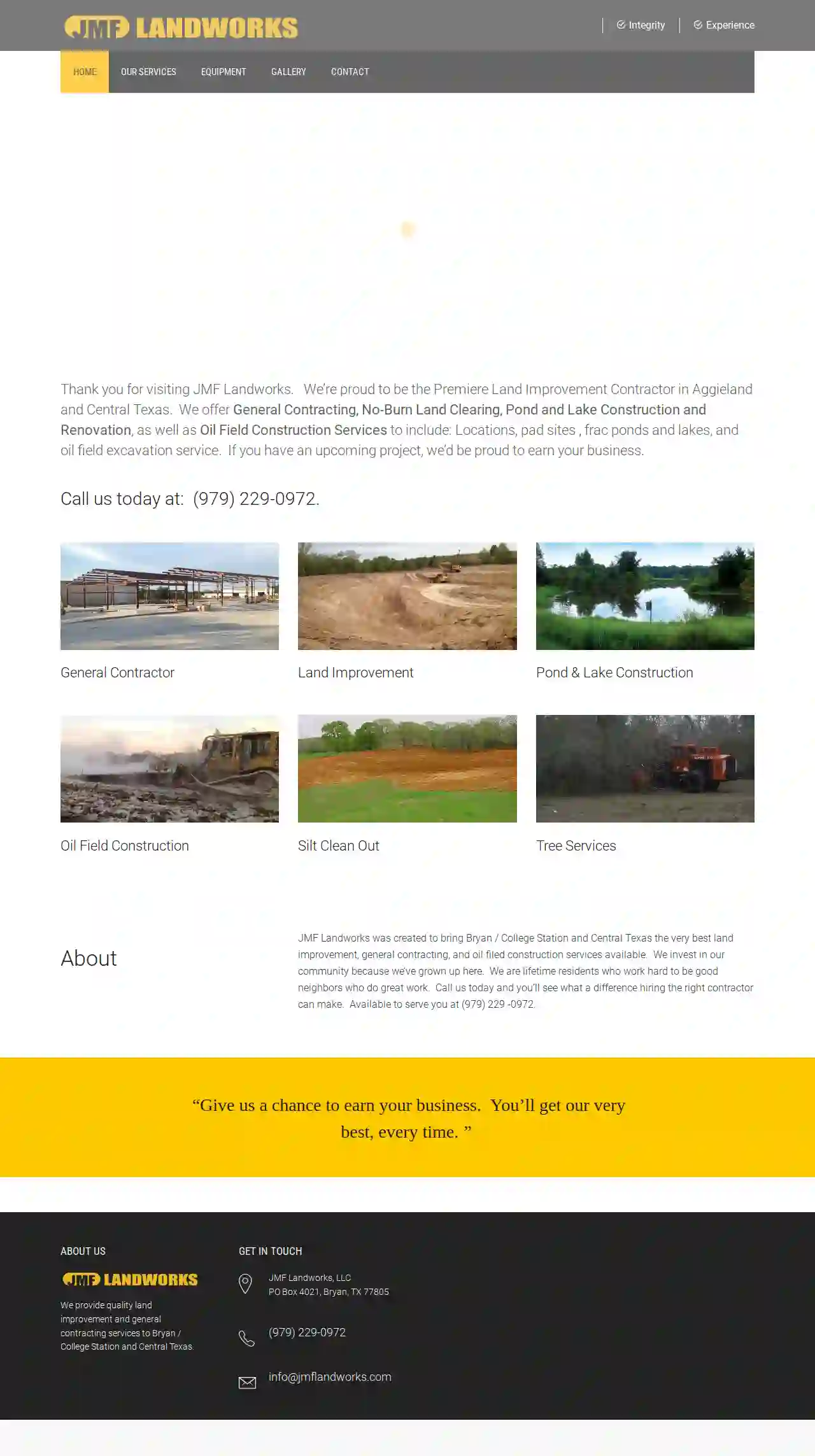
JMF Landworks
PO Box 4021, Bryan, 77805, USAbout JMF Landworks JMF Landworks was established to provide Bryan / College Station and Central Texas with the highest quality land improvement, general contracting, and oil field construction services. We are deeply invested in our community, having grown up here. As lifelong residents, we strive to be good neighbors and deliver exceptional work. Contact us today and experience the difference hiring the right contractor can make. We are available to serve you at (979) 229-0972. Our Commitment "Give us a chance to earn your business. You'll get our very best, every time."
- Services
- Why Us?
- Gallery
Get Quote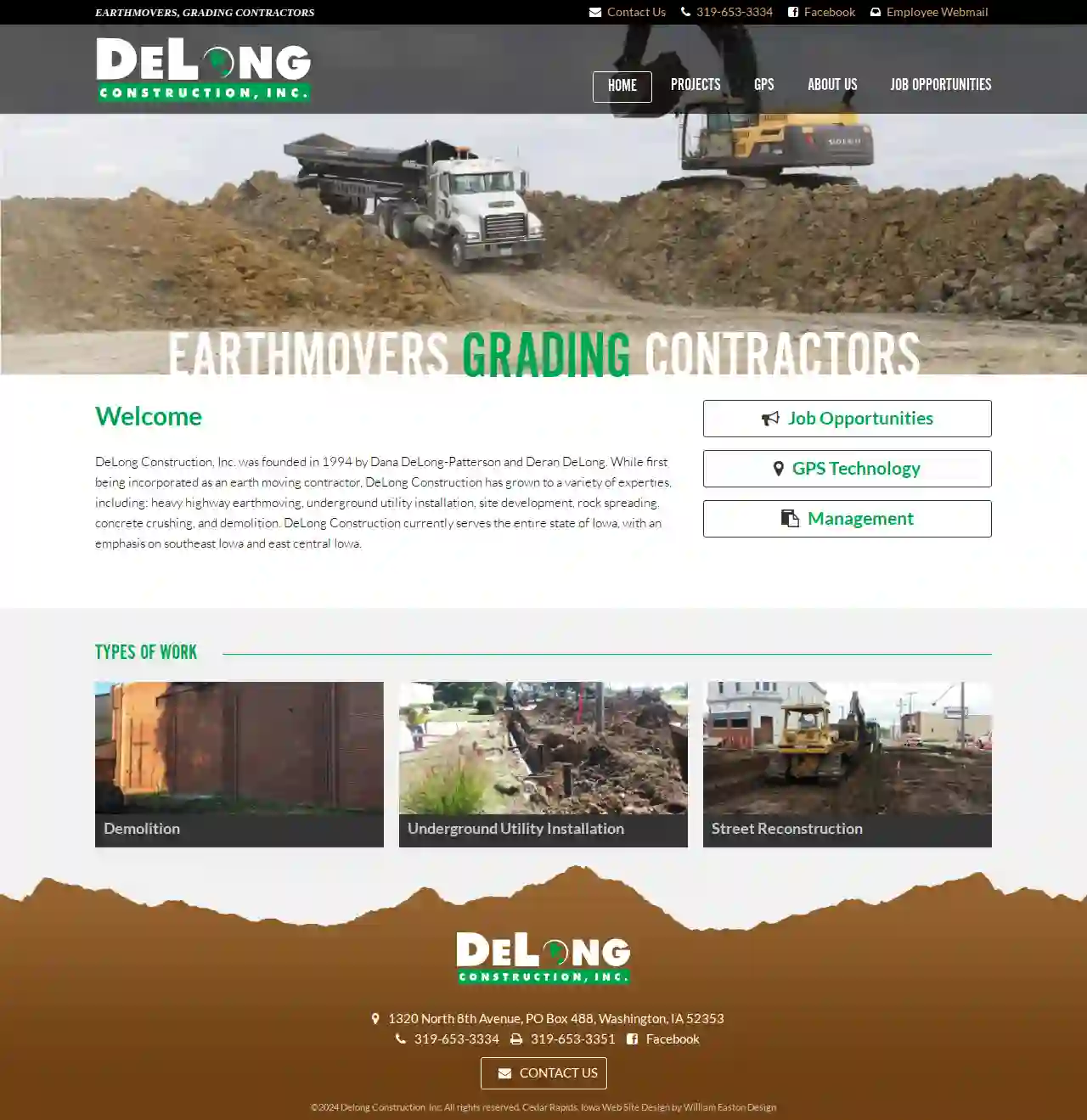
Delong Construction Inc
3.617 reviews1320 North 8th Avenue, PO Box 488, Washington, 52353, USAbout DeLong Construction, Inc. DeLong Construction, Inc. was founded in 1994 by Dana DeLong-Patterson and Deran DeLong. Initially established as an earth moving contractor, DeLong Construction has expanded its expertise to encompass a wide range of services, including heavy highway earthmoving, underground utility installation, site development, rock spreading, concrete crushing, and demolition. DeLong Construction proudly serves the entire state of Iowa, with a particular focus on southeast Iowa and east central Iowa.
- Services
- Why Us?
- Gallery
Get Quote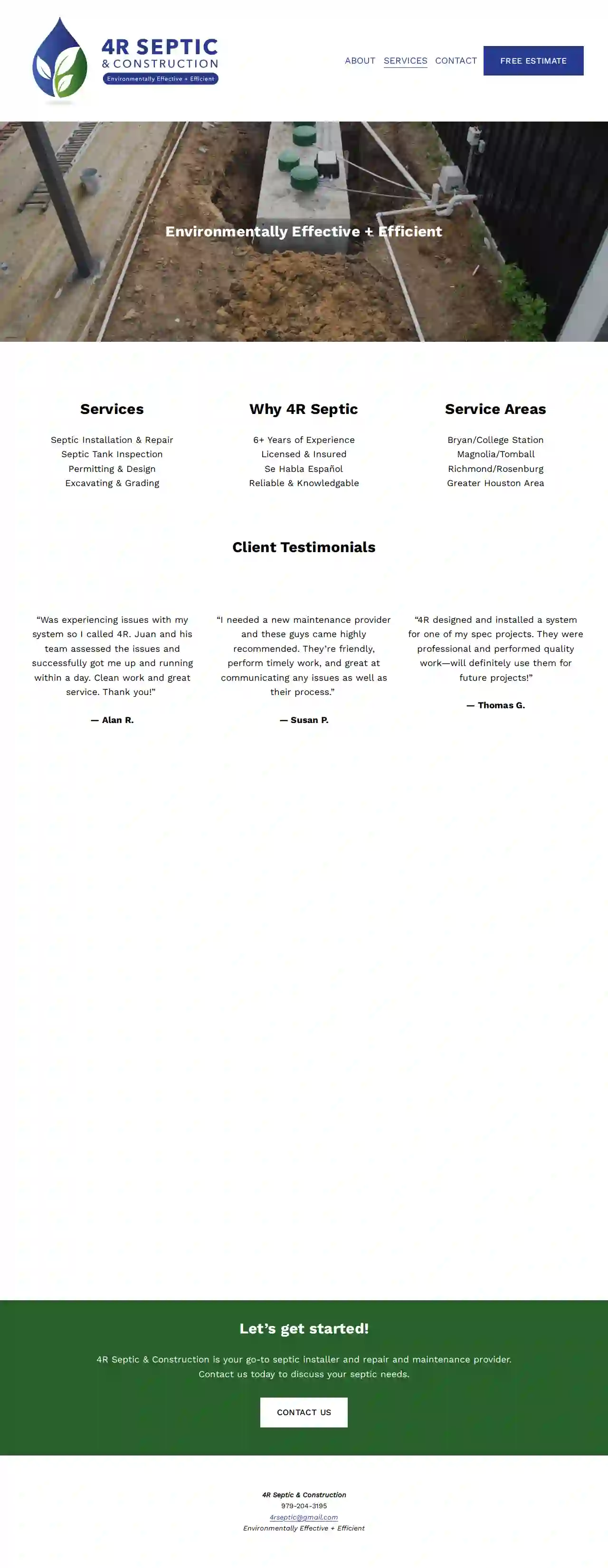
4R Septic & Construction LLC.
58 reviewsAmes, USAbout 4R Septic & Construction 4R Septic & Construction is a family-owned and -operated company with over six years of septic experience. We are a close-knit team of skilled installers, operators, and technicians who work together to provide excellent service with the ultimate goal of ensuring all customers operate in a safe and healthy environment. We specialize in residential septic installation, routine maintenance, and repair services and work hard to ensure all systems effectively and efficiently function while meeting local standards. 4R Septic & Construction is a licensed and insured company proudly serving the Greater Houston area. Contact us for a free estimate today!
- Services
- Why Us?
- Testimonials
- Gallery
Get Quote
Over 22,076+ Excavation Companies registered
Our excavation pros operate in Jefferson and surroundings!
ExcavationHQ has curated and vetted the Best Excavation Businesses arround Jefferson. Find a top & reliable pro today.
Frequently Asked Questions About Excavation Contractors
- Experience: Choose contractors with a proven track record and years of experience in excavation projects similar to yours.
- Licensing and Insurance: Verify that they are properly licensed to operate in your area and carry adequate insurance to protect you from liability in case of accidents or damage.
- Equipment and Resources: Ensure they have the necessary equipment and resources to handle your project efficiently and safely.
- Positive Reviews and References: Check online reviews and testimonials from previous customers. Request references and contact them to inquire about their experience with the contractor.
- Professionalism: Opt for a company that communicates clearly, provides detailed and transparent estimates, and has a responsive and courteous team.
- Excavators: Versatile machines with a bucket, arm, and rotating cab for digging, lifting, and moving earth.
- Backhoes: Similar to excavators but with a digging bucket on the back and a loader bucket on the front, ideal for trenching and smaller excavations.
- Bulldozers: Powerful machines with a large blade for pushing earth, clearing land, and leveling surfaces.
- Skid Steers: Compact and maneuverable loaders with various attachments (buckets, forks) for digging, loading, and grading in tight spaces.
- Trenchers: Specialized machines for digging narrow trenches for utilities.
- Dump Trucks: Vehicles for hauling excavated material to disposal sites.
- Basement Size: The larger the basement, the more excavation is required, increasing the cost.
- Soil Type: Excavating rocky or dense clay soil is generally more expensive than loose soil.
- Accessibility: Difficult-to-access sites might require specialized equipment or more labor, driving up costs.
- Foundation Type: The chosen foundation type (full basement, crawl space, slab) affects excavation needs.
- Underpinning: If underpinning (strengthening existing foundations) is necessary, it significantly increases costs.
- Disposal Fees: Hauling excavated soil to disposal sites adds to the overall expense.
How do I find a good excavation contractor?
What equipment is used for excavation?
How much does it cost to excavate a basement?
What is the difference between topsoil and subsoil?
Topsoil: The uppermost layer, typically rich in organic matter, nutrients, and microorganisms. It's essential for plant growth and is often darker in color.
Subsoil: The layer beneath the topsoil, containing less organic matter and generally denser. It provides support for roots but is less fertile than topsoil.
During excavation, topsoil is often removed and preserved separately for later use in landscaping, while subsoil is typically used for backfilling or other less demanding applications.
How do I find a good excavation contractor?
- Experience: Choose contractors with a proven track record and years of experience in excavation projects similar to yours.
- Licensing and Insurance: Verify that they are properly licensed to operate in your area and carry adequate insurance to protect you from liability in case of accidents or damage.
- Equipment and Resources: Ensure they have the necessary equipment and resources to handle your project efficiently and safely.
- Positive Reviews and References: Check online reviews and testimonials from previous customers. Request references and contact them to inquire about their experience with the contractor.
- Professionalism: Opt for a company that communicates clearly, provides detailed and transparent estimates, and has a responsive and courteous team.
What equipment is used for excavation?
- Excavators: Versatile machines with a bucket, arm, and rotating cab for digging, lifting, and moving earth.
- Backhoes: Similar to excavators but with a digging bucket on the back and a loader bucket on the front, ideal for trenching and smaller excavations.
- Bulldozers: Powerful machines with a large blade for pushing earth, clearing land, and leveling surfaces.
- Skid Steers: Compact and maneuverable loaders with various attachments (buckets, forks) for digging, loading, and grading in tight spaces.
- Trenchers: Specialized machines for digging narrow trenches for utilities.
- Dump Trucks: Vehicles for hauling excavated material to disposal sites.
How much does it cost to excavate a basement?
- Basement Size: The larger the basement, the more excavation is required, increasing the cost.
- Soil Type: Excavating rocky or dense clay soil is generally more expensive than loose soil.
- Accessibility: Difficult-to-access sites might require specialized equipment or more labor, driving up costs.
- Foundation Type: The chosen foundation type (full basement, crawl space, slab) affects excavation needs.
- Underpinning: If underpinning (strengthening existing foundations) is necessary, it significantly increases costs.
- Disposal Fees: Hauling excavated soil to disposal sites adds to the overall expense.
What is the difference between topsoil and subsoil?
Topsoil: The uppermost layer, typically rich in organic matter, nutrients, and microorganisms. It's essential for plant growth and is often darker in color.
Subsoil: The layer beneath the topsoil, containing less organic matter and generally denser. It provides support for roots but is less fertile than topsoil.
During excavation, topsoil is often removed and preserved separately for later use in landscaping, while subsoil is typically used for backfilling or other less demanding applications.